8 rounds of 20 red! The number of red cards in the same period is the highest in nearly six years, and the Super League must curb the surge of red cards
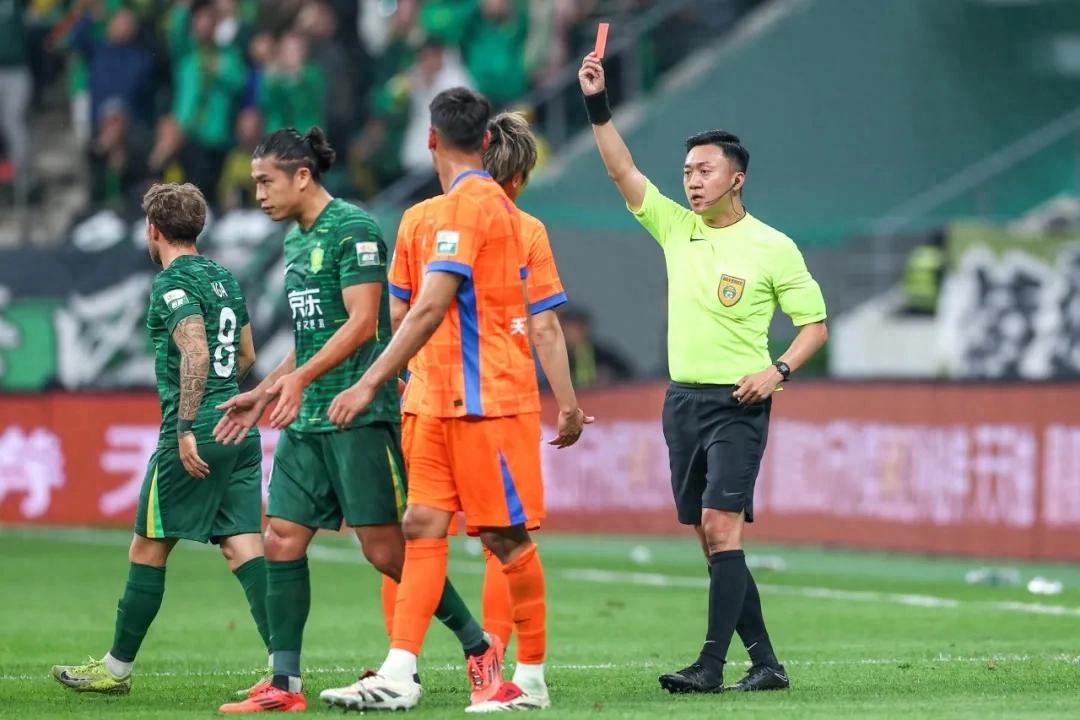
The reporter reported coldly "I stressed before the game not to get a card, to be careful and not to tackle the ball at will. But unfortunately, there are many similar situations in the Super League, and sudden changes have changed the game. This is the helpless speech of Shandong Taishan coach Cui Kangxi after Beijing Guoan's 6-1 victory over Shandong Taishan on April 19. At the beginning of the 27th minute of the first half, the Taishan team received 2 red cards in a row within 10 minutes, Wu Xinghan and Zeka went off the field one after another, which made the situation on the field take a sharp turn for the worse, and finally Guoan played the biggest score win so far this season.
Before the start of this season, the Chinese Football Association and the Chinese Football Federation, which was officially established at the beginning of the year, will take serious competition style and discipline as the main focus. However, there were 6 red cards in the first two rounds of the Chinese Super League, 5 red cards in a single round in the third round, and the 8th round of the Super League Guoan and Taishan was the first game in the Chinese Super League this season with 3 red cards, and all of them were direct red cards. The last time there were 3 red cards in a single game in the first 8 rounds of the Chinese Super League was in the 2nd round of the 2022 season, Chengdu Rongcheng vs. Beijing Guoan, and there were only 2 direct red cards.
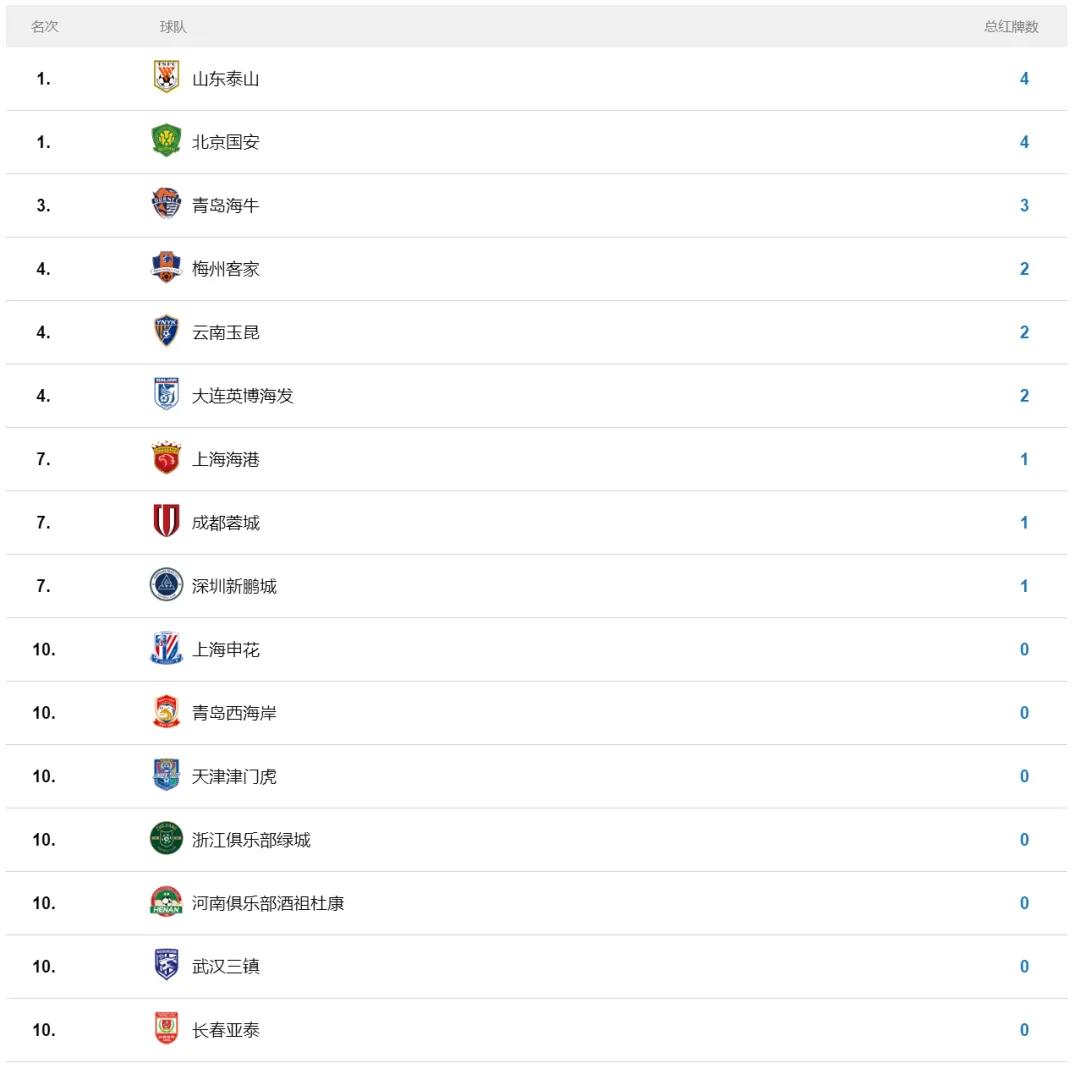
In the first 8 rounds of the Super League this season, 62 games (2 games postponed) totaled as many as 20 red cards, including 13 direct red cards. In the third round, there were 5 red cards in 8 games, and all of them were direct red cards. The first 8 rounds of the Chinese Super League had a maximum of 5 red cards in a single round, tying the most red cards in a single round in the first 8 rounds of the 2016 and 2019 seasons, but at that time, only 1 was a direct red card (2019 season) in the two seasons combined, and the highest red card in the first 8 rounds of the Chinese Super League was in the 2012 season, with 6 in a single round, but even at that time there were only 3 direct red cards.
This is the season with the most red cards in the first eight rounds of the Super League in the past six years since the 2019 season. In the first 8 rounds of the 2019 season, 64 matches in the Super League produced 21 red cards and 11 direct red cards. There were as many as 13 direct red cards in the first eight rounds of the Chinese Super League this season, while the most direct red cards in the first eight rounds of the Chinese Super League were in the 2014 season (12 cards). It is worth mentioning that in the 2015 season, there were only 7 red cards in the first 8 rounds of 63 games (1 game postponed), including 2 direct red cards, which was tied with the 2009 season (64 games) for the fewest red cards in the first 8 rounds of the Super League, and tied with the 2016 season (63 games) for the least number of direct red cards in the first 8 rounds of the Super League.
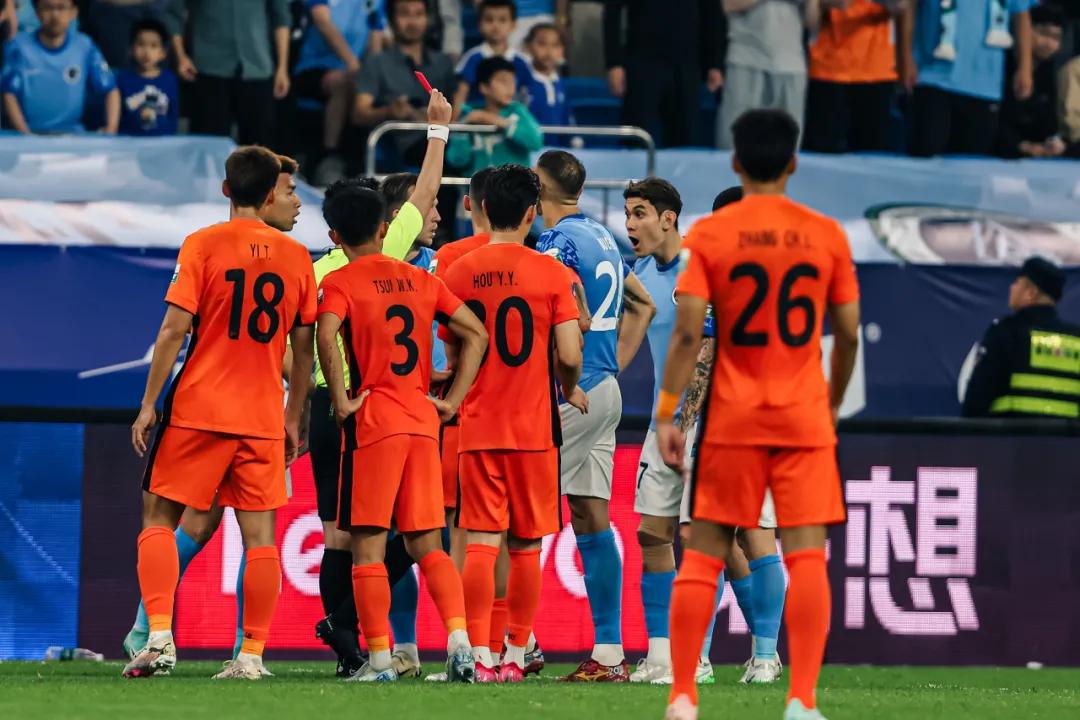
In the first 8 rounds of this season, the number of red cards in the Chinese Super League has skyrocketed, and many red cards have buried the team's advantageous situation.
In the first round of Shandong Taishan team at home against Henan team, goalkeeper Wang Dalei left the field with a red card early, and the Taishan team, which had one less person, failed to score all 3 points; In the second round of the promotion of Dalian Yingb, Shandong Taishan, Kalanga equalized the score after 6 minutes of red card, one less Dalian InBev lost 3 goals in a row; In the same round, Chengdu Rongcheng directly red card before the end of the first half (later commented as a misjudgment), and the Rongcheng team, which had one less person, conceded a goal in the second half and lost to Tianjin Jinmen Tigers at home; In the third round, only 8 minutes after Meizhou Hakka led Shandong Taishan 3-2 at home, Zhong Haoran's red card allowed Taishan to score two goals in a row to turn the tables; Beijing Guoan led Chengdu Rongcheng 1-0 at home, and after Ngadewu's red card, the Guoan team was equalized by one less person; In the 4th round, Yunnan Yukun played Shanghai Shenhua away, and Yi Teng was red card 1-1 in the second half, and the Shenhua team with one more person was then reversed by Mineiro's brace; In the 5th round, Yunnan Yukun played Qingdao Manatee at home, Song Wenjie received a red card in the 78th minute, and the Yukun team, which had one more person 8 minutes later, scored the winning goal.
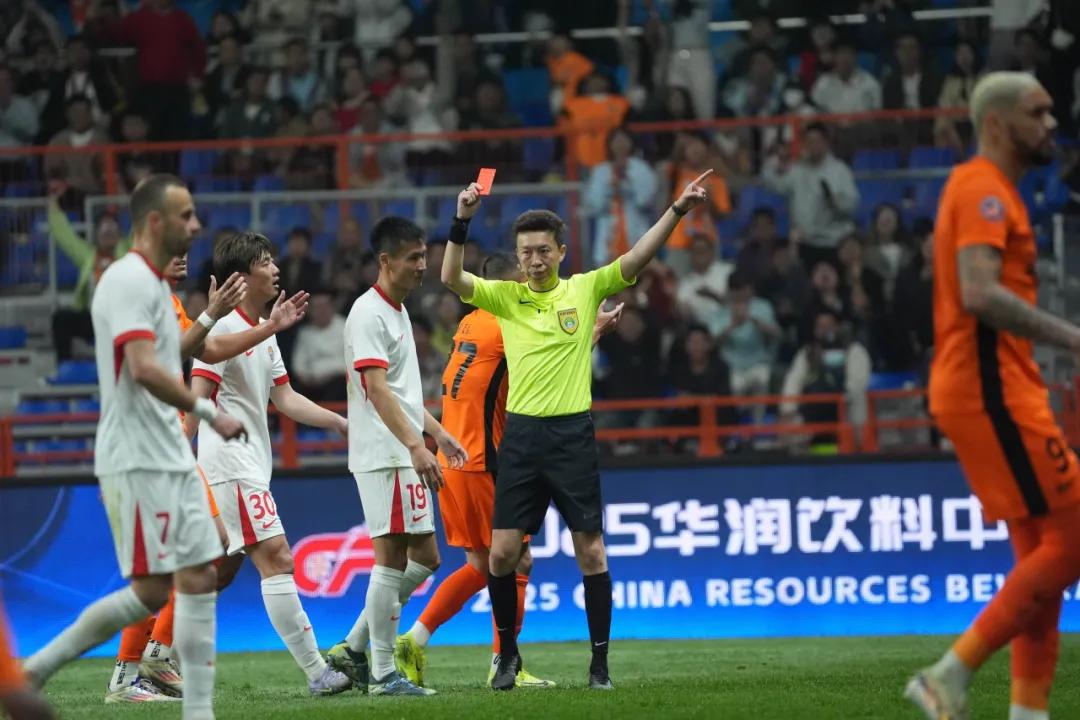
In terms of the distribution of red cards in the first 8 rounds of the Chinese Super League, 9 of the 16 Chinese Super League teams received red cards. Guoan had red cards in each of the first three rounds, so they lost serious points. Guoan and Taishan tied for the top spot with 4 red cards in the first 8 rounds, while Taishan and Manatee each had 3 direct red cards. Among the 20 red cards, only 4 are foreign players: Kalanga (Dalian InBev), Ngadeu (Beijing Guoan), Ngom (Meizhou Hakka), Zeka (Shandong Taishan), and as many as 16 local players.
Among them, direct red cards account for two-thirds of the total number of red cards, and many are dangerous and egregious fouls. Taishan's Wu Xinghan, Manatee's Jin Yangyang and Lin Chuangyi shoveled opponents, Song Wenjie raised his foot too high and kicked his opponent in the face, all of which were dangerous actions and were punished. How to let the Chinese Super League players control their technical actions and emotions and avoid the advantages of the team becoming disadvantages caused by red will be a topic that the Chinese Super League teams must attach great importance to in the future.
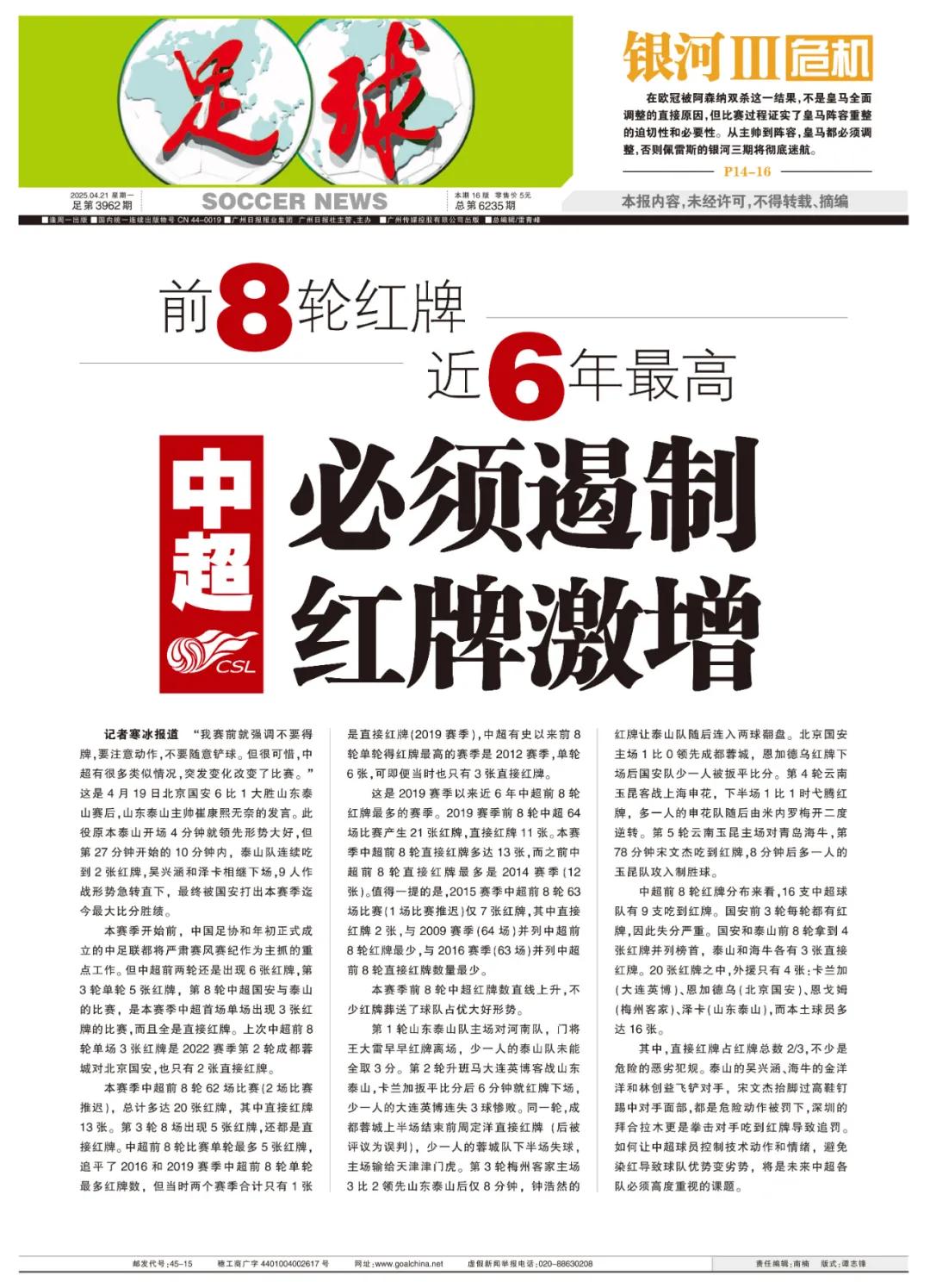


Wonderfulshortvideo
Things you really love to see


When you use your girlfriends shower 🚿 @Emily Bourne @LUSH


Neymar highlights neymar edit neymar lamine yamal celebration


Arsenal 1-0 chelsea havertz goal


Ahead of his 100th cap, Sir Keir Starmer had this message for Maro Itoje…


yamal goal yamal instagram yamal dribble barcelona 2-1 albacete yamal highlights yamal edit


casemiro goal casemiro assist casemiro 6 7 celebration








 Links
Links
 Contact
Contact
 App
App


